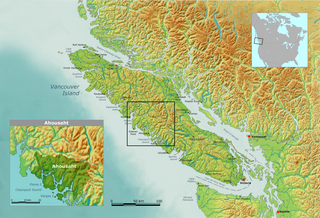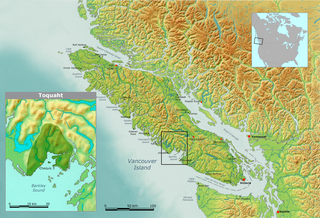This page is based on this
Wikipedia article Text is available under the
CC BY-SA 4.0 license; additional terms may apply.
Images, videos and audio are available under their respective licenses.
The Mowachaht/Muchalaht First Nations are a First Nations government on the west coast of Vancouver Island in the Canadian province of British Columbia. The Mowachaht/Muchalaht First Nations are a member nation of the Nuu-chah-nulth Tribal Council, which spans all Nuu-chah-nulth-aht peoples except for the Pacheedaht First Nation.

Tseshaht First Nation is an amalgamation of many tribes up and down Alberni Inlet and in the Alberni Valley of central Vancouver Island in the Canadian province of British Columbia. They are a member of the Nuu-chah-nulth Tribal Council which includes all other Nuu-chah-nulth-aht peoples except the Pacheedaht First Nation.

Ahousaht, also spelled Ahousat, is the principal settlement on Flores Island, in British Columbia, Canada. Accessible only by water or air, Ahousaht is a small community predominantly composed of First Nations people from the Nuu-chah-nulth nation. The settlement is named for the Ahousaht subgroup of the Nuu-chah-nulth, whose modern Indian Act government is the Ahousaht First Nation which combines the Ahousaht, Manhousaht and Keltsmaht under one administration. The other main settlement of the Ahousaht First Nation is at Marktosis.

The Ditidaht First Nation is a First Nations band government on southern Vancouver Island in British Columbia, Canada.
The Kyuquot/Cheklesath First Nation is a First Nations government based at Kyuquot, located on the outer coast of Kyuquot Sound, on the west coast of Vancouver Island in British Columbia, Canada. It is a member of the Nuu-chah-nulth Tribal Council.

The Ehattesaht First Nation or ʔiiḥatisatḥ činax̣int is a First Nations government based on the west coast of Vancouver Island in British Columbia, Canada. It is a member of the Nuu-chah-nulth Tribal Council.

The Toquaht Nation is a First Nations government based on the west coast of Vancouver Island in British Columbia, Canada. It is a member of the Nuu-chah-nulth Tribal Council.

The Nuchatlaht First Nation is a First Nations government based on the west coast of Vancouver Island in British Columbia, Canada. It is a member of the Nuu-chah-nulth Tribal Council.

The Pacheedaht First Nation is a First Nations band government based on the west coast of Vancouver Island in British Columbia, Canada. Although the Pacheedaht people are Nuu-chah-nulth-aht by culture and language, they are not a member of the Nuu-chah-nulth Tribal Council and define themselves differently.
Kyuquot Sound is a complex of coastal inlets, bays and islands on northwestern Vancouver Island in the Canadian province of British Columbia.

The Uchucklesaht First Nation is a First Nations government based on the west coast of Vancouver Island in British Columbia, Canada. It was a member of the Nuu-chah-nulth Tribal Council, but became a Member of the Maa-Nulth First Nations in 2006.
Kiix-in, or Kiix?in , earlier romanized as Keeshan, was the principal residence of the Huu-ay-aht (Ohiaht) group of the Nuu-chah-nulth people. The name is onomatopoeic, and comes from the sound of waves crashing against the rocks below the village. It was initially romanised as "Keeshan", but was redesignated "Kiix-in " in line with the Maa-nulth Treaty.
The Nuu-chah-nulth Economic Development Corporation (NEDC) was incorporated in 1984 under the Canada Corporations Act as a not-for-profit organization. Although it is not tied directly to the NTC, it was formed to help the Nuu-chah-nulth people achieve economic and social independence by providing financial assistance and advisory services. NEDC manages a number of funding programs aimed at enhancing economic development in the region.
Uu-a-thluk means "taking care of" in the Nuu-chah-nulth language spoken on the west coast of Vancouver Island and is the Nuu-chah-nulth aquatic management organization. This organization was established with financial support from the federal government in recognition of the need to manage aquatic resources wisely together with the many sectors and interests working in the area. The philosophy that drives the organization is the idea that working cooperatively with other governments, communities and individuals is required to achieve sustainable and fruitful management.
Esowista Indian Reserve No. 3, also known as Esowista 3, is an Indian reserve located on the Esowista Peninsula in the Clayoquot Sound region of the west coast of Vancouver Island, British Columbia, Canada. Located at the head of Wickaninnish Bay, just east of Schooner Cove, it is part of the group of reserves under the governance of the Tla-o-qui-aht First Nations of the Nuu-chah-nulth peoples. Its population in 2006 was 160.

Whaling on the Pacific Northwest Coast encompasses both aboriginal and commercial whaling from Washington State through British Columbia to Alaska. The indigenous peoples of the Pacific Northwest Coast have whaling traditions dating back millennia, and the hunting of cetaceans continues by Alaska Natives and to a lesser extent by the Makah people.









